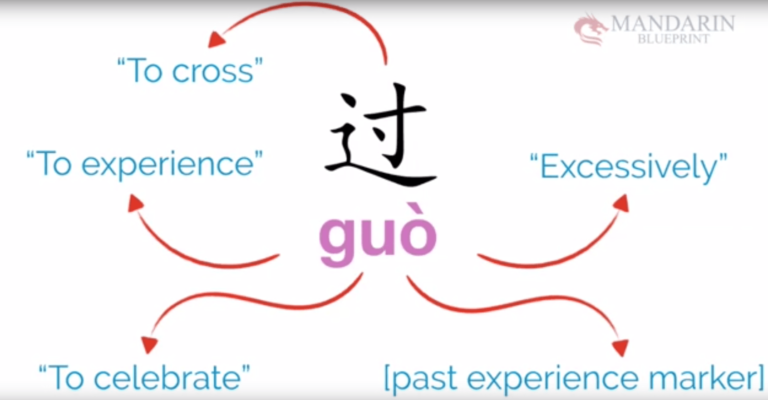Chinese Character 过 Guò – Part 2

This is Part 2 of our discussion of the Chinese Character 过 guò. Check out Part 1 here.
Even though the original meaning of the Chinese Character 过 is “to cross”, you will most commonly see it used as a grammatical particle. What grammatical particle, you ask?
You’ve never studied it? 你没有学过吗 nǐ méiyǒu xuéguo ma? Well, that’s actually exactly what it indicates, that you have or haven’t experienced before whatever action precedes 过.
If you go to a restaurant with a friend, you might ask her “Have you been here before?”, in which case you would use “来过” láiguo to ask about the experience ever having happened at all in the past.
You can apply this idea to loads of different Verb-Object combinations:
玩游戏 – wán yóuxì- to play (玩) a game (游戏)
玩过游戏- to have played a game before
跳伞- tiàosǎn- to skydive (literally “jump-umbrella”)
跳过伞- to have skydived before
上大学- shàng dàxué- to go to university
上过大学- to have gone to university before
This general meaning of having undergone or experienced something is quite clear in a number of Chinese words where 过 is not a grammatical particle, but rather adds its meaning of “to experience” to the word itself.
Perhaps the most obvious example to illustrate this point is the word for “the past” in Chinese 过去 guòqù (note: in the previous article we talked about 过去 as meaning “to go over”, but when it is that meaning “去” switches to fifth tone guòqu). All the experiences (过) that have gone (去) are a way of conceptualizing the past.
Mandarin Emotions
Mandarin has a cool way of conceptualizing emotions, and one of my favorites is the word for “sad”, which is 难过 (nán). It literally means “difficult to experience”.
People often say “Life is a journey, not a destination”. Well said! Learn to love the process and all that…but speaking of “the process”, the Chinese word for “process” could be directly translated as “experience journey”: 过程 chéng. So look at that, Mandarin gets you to a wise perspective on life in one word, not one of those long and tedious sentences!
The Chinese Character 过 Has Even More Meanings
Perhaps we’ve written too much about 过,its a bit excessive don’t you think? Oh, I just can’t help myself, because of course 过 has yet another meaning of “overly” or “excessive” and it’s worth exploring a bit, no need to be overly-sensitive! (过敏 mǐn). Actually, 过敏 is a bit more specific than just “overly-sensitive”.
Have you ever considered what “allergies” really are? Well, the Chinese have, and they articulated it quite well with this word by saying that a person is “overly-sensitive”, or 过敏, towards something like cats, peanuts, fidget spinners, etc. Allergic to pollen? Just tell the doctor you are 过敏 to pollen and he’ll sort you right out.
Most commonly Chinese learners will hear a Mandarin speaker say “太过分了!tàiguòfènle!”, which essentially just means “over the top”. Since one of the meanings of “分” is “to distribute”, it makes a lot of sense. Usually, it’s used in the judgment of somebody’s behavior.
Had a bit of a drunken rant about something or someone and went too far? Well, you can follow it up with “太过分了” and an embarrassed smile, and you’ll likely be forgiven.
We hope you understood everything on the 过程 of learning about 过。No need to be 难过!The more you learn about Chinese characters the more you will find Mandarin to be super easy.








